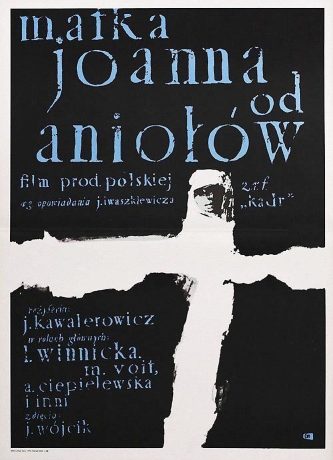 It’s not a particularly well-known film, but the Polish horror-fest MOTHER JOAN OF THE ANGELS (MATKA JOANNA OD ANIOLOW) is one of the great nunsploitation epics, a stylish, artistic and deeply unnerving depiction of faith and evil. Its basis is the alleged 1634 instance of mass possession that took place in a convent located in Loudun, France, as chronicled in Aldous Huxley’s 1952 docu-novel THE DEVILS OF LOUDUN—which inspired the 1961 play THE DEVILS by John Whiting, the 1969 Krzysztof Penderecki opera THE DEVILS OF LOUDUN (DIE TEUFEL VON LOUDUN) and the Ken Russel film THE DEVILS (1971)—as well as the 1949 novel DREAMS OF ROSES AND FIRE (DROMMAR OM ROSOR OCH ELD) by Eyvind Johnson.
It’s not a particularly well-known film, but the Polish horror-fest MOTHER JOAN OF THE ANGELS (MATKA JOANNA OD ANIOLOW) is one of the great nunsploitation epics, a stylish, artistic and deeply unnerving depiction of faith and evil. Its basis is the alleged 1634 instance of mass possession that took place in a convent located in Loudun, France, as chronicled in Aldous Huxley’s 1952 docu-novel THE DEVILS OF LOUDUN—which inspired the 1961 play THE DEVILS by John Whiting, the 1969 Krzysztof Penderecki opera THE DEVILS OF LOUDUN (DIE TEUFEL VON LOUDUN) and the Ken Russel film THE DEVILS (1971)—as well as the 1949 novel DREAMS OF ROSES AND FIRE (DROMMAR OM ROSOR OCH ELD) by Eyvind Johnson.
…one of the great nunsploitation epics, a stylish, artistic and deeply unnerving depiction of faith and evil.
MOTHER JOAN OF THE ANGELS, inspired by a 1946 novella by Jaroslaw Iwaszkiewicz, takes place after the events described in those previous accounts, which all tend to focus on the figure of Father Grandier, who was burned at the stake for allegedly being in league with the Devil and seducing the possessed nuns. Here the protagonist is a priest called in following the execution to oversee a proper exorcism.
Until he alienated many in the international filmmaking community, director Jerzy Kawalerowicz, who reached his arguable pinnacle with MOTHER JOAN OF THE ANGELS, was widely considered one of Poland’s greatest filmmakers—other impressive Kawalerowicz features include the thrillers SHADOW (CIEN; 1956) and NIGHT TRAIN (POCIAG; 1959). Unfortunately his actions of 1983—when in his position as the head of a prestigious state film unit Kawalerowicz publicly opposed filmmakers who supported Polish solidarity—had the effect of blackening his reputation, and that of his films, MOTHER JOAN OF THE ANGELS included.
The film’s construction eschews the sociopolitical concerns that preoccupied Huxley et al in favor of a more intimate account. It focuses on Father Josef Surin (Mieczyslaw Voit), an insanely pious, self-sacrificing priest who when eating likes to slice his bread as thin as he possibly can (so he won’t be called over-indulgent). He’s summoned to a secluded convent to exorcise the demons supposedly infecting the mother superior. As mentioned earlier, another priest has attempted to calm things down and been burnt at the stake for his efforts, with the ashes still smoldering when Father Joseph arrives.
Mother Joan (Lucyna Winnicka), who wears a perpetual smirk and has a tendency to lapse into demonic voices, deeply unnerves Father Joseph during their first meeting. She claims to be possessed by no less than eight demons, each of which have to be driven out separately in an exorcism that occurs in a church where much holy water is flung and Mother Joan’s fellow nuns are made to lie flat on the ground.
Father Joseph all the while finds himself questioning his faith, and engages in lengthy bouts of self-flagellation. His spiritual crisis only deepens as he finds himself becoming attracted to Mother Joan, thus setting in motion what Kawalerowicz claimed was the film’s true subject: “It is a love story about a man and a woman who wear church clothes and whose religion does not allow them to love each other.”
The proceedings admittedly grow monotonous in the final third, as the spiritual crisis of Josef and his fellow priests deepens and the film turns into a tortured rumination on misplaced faith (and so becomes very Ingmar Bergman-esque). The happy ending is uninvigorating, rehashing a point that’s voiced more than once in the course of the film: “All redemption is love.”
Yet throughout it all the viewer’s attention is riveted by the expressiveness and invention of Kawalerowicz‘s imagery. The visual mastery on display exists in an extremely rarified league, with names like Welles, Kubrick and Tarkovsky being among the comparisons. The high contrast black and white cinematography, incredibly rich depth of field and wizardly use of light and shadow are without parallel, as is the performance of Lucyna Winnicka, who evokes both apprehension and sympathy in the title role.
The film may not seem too shocking these days (failing, perhaps, to earn the “sploitation” portion of nunsploitation), but it was considered quite a taboo breaker in 1961. The Catholic church condemned the film and put signs on church doors warning parishioners they’d go straight to you-know-where for viewing it. Yet MOTHER JOAN OF THE ANGELS still stands as one of the screen’s most potent denunciations of religious hypocrisy, and a must-see for anyone with any interest whatsoever in the subject matter.
Vital Statistics
MOTHER JOAN OF THE ANGELS (MATKA JOANNA OD ANIOLOW)
Film Polski Film Agency/ Studio Filmowe Kadr
Director: Jerzy Kawalerowicz
Screenplay: Tadeusz Konwicki, Jerzy Kawalerowicz
(Based on a novel by Jaroslaw Iwaszkiewicz)
Cinematography: Jerzy Wójcik
Editing: Wieslawa Otocka
Cast: Lucyna Winnicka, Mieczyslaw Voit, Anna Ciepielewska, Maria Chwalibóg, Kazimierz Fabisiak, Stanislaw Jasiukiewicz, Zygmunt Zintel, Jerzy Kaczmarek, Franciszek Pieczka, Jaroslaw Kuszewski, Lech Wojciechowski, Marian Nosek, Jerzy Walden, Zygmunt Malawski
